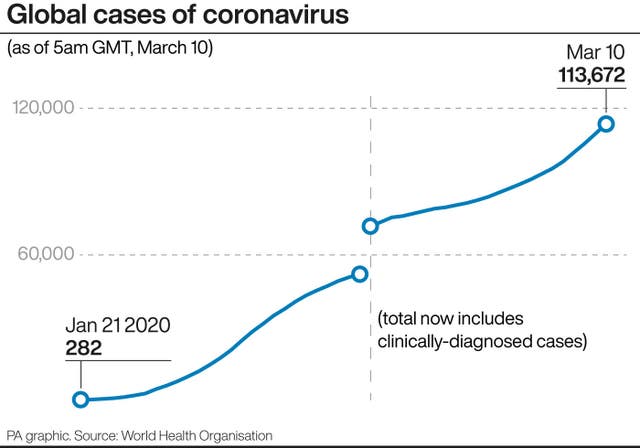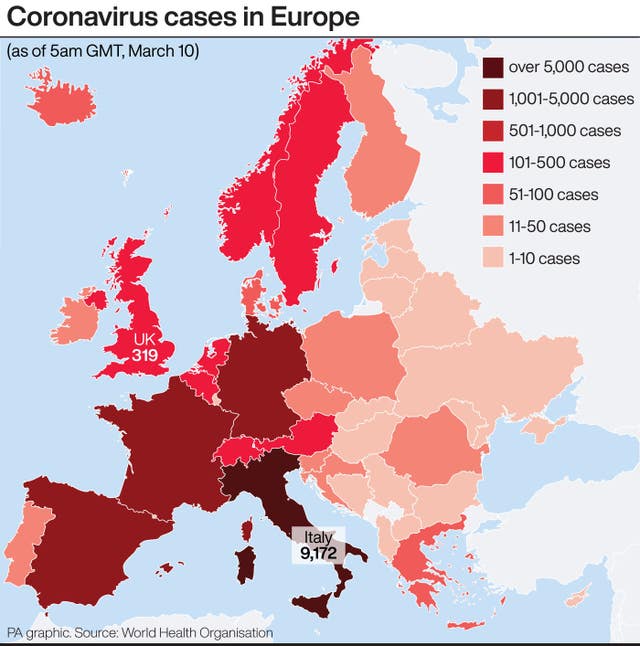
Italy extended coronavirus travel restrictions previously limited to the country’s north to the whole country on Tuesday, with soldiers and police enforcing bans.
Some 9,172 people have been infected with Covid-19 in Italy, with 463 deaths, and there is a growing sense that the numbers will only worsen.
“We’re only at the beginning,” said Dr Massimo Galli, head of infectious disease at Sacco Hospital in Milan, where people at the city’s main railway station were required to sign forms certifying the necessity of their travel.
However, the Italian government assured its citizens that supermarkets will remain open and stocked after panic buying erupted after the broadened anti-virus measures were announced nationwide, sparking overnight runs on 24-hour markets.
Prime Minister Giuseppe Conte’s office issued a clarifying statement after he signed the new decree late on Monday, stressing that movement outside homes for “normal necessities” such as grocery shopping will be allowed, as well as for work or health reasons.
The statement said runs on supermarkets were contrary to the intent of the new decree which aims to prevent Italians from congregating.

Meanwhile, China’s president visited the city where the coronavirus outbreak started as people across the world braced for the possibility of recession.
President Xi Jinping’s trip to Wuhan – his first since the start of the outbreak – came as parts of China return to normal, and was a sign of the diminishing threat the illness presents in the country as it spreads west.
Outbreaks have worsened in France, Spain and Germany, and fear is growing in the United States, where more than 750 people are infected and even some top political leaders were quarantined.
For most people, the new coronavirus causes only mild or moderate symptoms, such as fever and cough, but for some, especially older adults and people with existing health problems, it can cause more severe illness, including pneumonia.
The World Health Organisation says people with mild illness recover in about two weeks, while severe cases may last three to six weeks.
In mainland China, where the outbreak emerged in December, almost three-quarters of its more than 80,000 patients have recovered.

Nevertheless, the virus has shaken global markets, with stocks taking their worst one-day beating on Wall Street since 2008 and oil prices suffering their most brutal losses since the start of the 1991 Gulf War.
Even with Asian markets posting modest gains on Tuesday, fear was rampant that economies stood on the brink of recession.
“Right now, it’s all-out panic,” said Phil Flynn, of the Price Futures Group brokerage.
Mr Xi’s trip to Wuhan came as the country recorded just 19 new cases of the virus on Tuesday.
State media reported that he would inspect virus prevention and control efforts and visit medical workers, patients and others on the front lines of the virus fight.
The visit was also likely to be seen as an attempt to bolster views of the ruling Communist Party’s handling of the crisis.
Mr Xi was conspicuously absent from the public eye during the early days of the outbreak and the alarm was not raised until late January.
Wuhan and nearby cities have been under lockdown since then, however, in a virus-containment measure.
Ying Yong, the party secretary of Hubei province where Wuhan is located, told local officials that preparations should be made for resuming business production and the safe and orderly movement of individuals, according to a notice published on Hubei’s government website.
There are already signs that the lockdown is loosening.

Jingzhou, a city in Hubei, has ordered roads and village entrances in low-risk areas to be reopened to restore agricultural production.
The move towards normality in China and improving reports from South Korea – where new infections continue to fall – contrasted with a widening problem elsewhere in the world.
Italy’s far-reaching restrictions are set to last until April 3 and violators risked up to three months in jail or fines of 206 euros (£180). Schools and universities remain closed and pubs, eateries and cafes are to close at dusk.
“Our habits must be changed, changed now,” Prime Minister Giuseppe Conte said.
In the US, Donald Trump was planning to announce proposals aimed at curbing the economic fallout from the outbreak. He said the measures would include payroll tax relief.
The president shook hands with supporters earlier in the day and flew back from a Florida fundraiser with a politician who later went into a voluntary quarantine because he came into contact with someone who had tested positive for the virus.
Mr Trump’s incoming chief of staff also went into quarantine, amid concerns over a conservative political gathering an infected person attended.
Worldwide, more than 114,000 cases of the virus have been reported in about 100 countries.
"The great advantage we have is that the decisions we all make – as governments, businesses, communities, families & individuals – can influence the trajectory of this #COVID19 epidemic”
–@DrTedros #coronavirus pic.twitter.com/lLeXgbM08G
— World Health Organization (WHO) (@WHO) March 9, 2020
WHO director-general Tedros Adhanom Ghebreyesus said on Monday that “the threat of a pandemic has become very real”.
The most recent additions are Panama, adding to a few dozen cases in Latin America, and Mongolia, which borders China.
Authorities there said on Tuesday that the country’s first virus patient is a French energy worker who met colleagues and travelled while he was infected.


Comments: Our rules
We want our comments to be a lively and valuable part of our community - a place where readers can debate and engage with the most important local issues. The ability to comment on our stories is a privilege, not a right, however, and that privilege may be withdrawn if it is abused or misused.
Please report any comments that break our rules.
Read the rules here